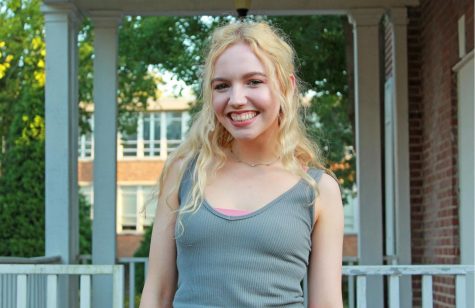Teenage Mental Health Epidemic: Jordan Thompson
MSMS junior Jordan Thompson tells her story as she battled mental health issues growing up. Mental health issues are especially prevalent in American teenagers today.
April 23, 2020
“You can’t let it get too late. Your teenage years aren’t supposed to be sad; they’re supposed to be happy. You may have some mood swings but no one is supposed to be miserable. No one is supposed to want to die.”
Jordan Thompson is a junior at The Mississippi School for Mathematics and Science. She grew up on the coast and has lived in Mississippi her entire life. She is active in many clubs at MSMS, including March For Our Lives and GSA, and was a part of the Lady Waves Soccer Team. She loves the book “Looking For Alaska” by John Green so much that she named her dog Alaska.
David Gipson, a fellow March For Our Lives member and MSMS junior, describes her as “honest, dedicated, insanely smart, funny and endlessly kind.”
Kate McElhinney, an MSMS junior and close friend of Jordan’s, remarked, “She’s so driven in everything she does. Her innate ability to love others is a quality I feel we should all strive to have.”
Jordan Thompson is loved by many and leads a fulfilling life. However, like many teens across America, she struggles with mental health.
Jordan is not alone. In the U.S., 11 percent of teenagers experienced at least one major depressive episode in the last year, and 7 percent experience severe depression.
“When I was in middle school I was struggling really bad. I self-harmed a lot. I was also, like, starving myself. It was really bad whenever I was 13 [or] 14. One time I had written a suicide note and given it to my best friend Taylor because of what I had planned. And you know, she was worried about me, so she turned it into the counselors. And they didn’t pull me out of class, they didn’t try to talk to me or anything. All they did was call my mom. The school never came to me about it or tried to do anything. A couple of weeks later I was reported again for actually doing it, like actually trying to kill myself.”
Suicide is the second leading cause of death for teenagers and adolescents. 15.8 percent of high school students seriously consider suicide at least once within a 12 month period, and the numbers are climbing.
Thankfully, Jordan survived her attempt. However, she feels that her school’s response was extremely irresponsible, for they never once contacted her personally during the multiple times she was reported to her counselors for various mental health issues.
“They never tried to see if I got help or if my mom did anything. Luckily, I have good parents, but if they had called into an abusive household or something like that to where it could’ve put me at risk I don’t know what would’ve happened. They handled it very carelessly, and I think that schools need to be more prepared for students with mental health issues.”
For teenagers, it has been found that the rate of psychiatric visits for danger to self or others in weeks when school was in session was approximately 118 percent greater than in weeks when school wasn’t in session, in a study done by Collin Lueck.
Jordan expressed her view that schools need to take responsibility for the mental health of their students and need to have good procedures in place for those struggling.
“Adults need to start taking teens more seriously whenever they try to come to them about their mental health. A lot of the times they try to come to them but are told “you’ll get over it” or whatever. But, you know, they don’t get over it. Blaming it on “teen angst” won’t stop that child from trying to commit suicide. You can’t let it get too late. Your teenage years aren’t supposed to be sad; they’re supposed to be happy. You may have some mood swings but no one is supposed to be miserable. No one is supposed to want to die. “
According to the American Psychological Association, teenagers are the most stressed and anxious demographic in America, and 83 percent of teenagers cite school as a cause of stress. Jordan reiterated the idea that an abundance of stress leads to deteriorating mental health.
“Something needs to be done to help the stress in teenagers,” said Thompson. “There’s only 24 hours in a day, and it’s filled with school, homework–and then go to sleep. I think that teenagers deserve more time to be able to take care of themselves and find ways to make themselves happy.”
Elevated levels of stress and social isolation common to the experience of human teenagers are shown to cause behaviors related to mental illness. 1 in 3 teenagers will meet the criteria for an anxiety disorder by the time they are 18.
In fact, “Johns Hopkins researchers established a link between elevated levels of the stress hormone cortisol in adolescence that triggered genetic changes that, in young adulthood, that can result in mental illness in those predisposed to it.”
Jordan discussed how even though such a large percentage of teenagers deal with mental health issues there is still such a large negative stigma around talking about it.
“It’s not like it’s something that people can control, you know? I know personally that it’s hard to reach out to people whenever you, you know, you feel like you’re mentally ill. A lot of my friends at my old school, you know, they’re normal in the brain. And it was really hard for me because I felt like I was really alone. Now that I have a lot more friends that are more like me and are willing to talk about their mental health it’s a lot better. The stigma around mental illness needs to change; it needs to be normalized.”
Jordan is a strong advocate for mental health activism, as she believes that patients are often shuffled along without any real progress. Her stay in a mental hospital highlighted many issues in the mental healthcare system to her. She believes that it often seems like it’s not about the patients themselves, but rather the money the patients bring (or rather, the money the patient’s insurance brings).
“A lot of the people that come into psych wards leave worse than they came in because you’re just there because they want your money. You’re not taken care of properly. I know some of the people who left my mental hospital came right back two weeks later because nothing had changed. Luckily, my stay [at the mental hospital] affected me in a positive way and actually made me feel better, but that’s not most people’s experience.”
In the U.S., hospitalization for people with mental illnesses has increased faster than hospitalization for any other condition, and readmission rates are startlingly high.
Thompson shared a story during our interview regarding a friend from the mental hospital.
“I remember one of the girls that I was in the mental hospital with, she was a teenager, like 17, and [before coming to Thompson’s hospital] they had put her in the actual hospital, not the mental hospital, and they put her in a room by herself and wouldn’t talk to her. They wouldn’t tell her what was going on and left her alone for a really long time. They treated her like she was crazy. God, I felt so bad for her. I just think that the way psych wards in most places are handled is not okay.”
Despite the broken aspects of our healthcare system, Jordan also wants people to know that it’s okay to ask for help, and you are never alone.
“It can be scary to talk to people about your feelings and how you just don’t feel normal, but if you talk to somebody it’s the fastest way to make it better for yourself. Instead of being miserable reach out to a close friend or an adult. For instance, I recently reached out to my teacher and talked to him and he was basically like ‘If you need anything, if you need help getting an appointment or something let me know.’ The faster you reach out the faster you’ll get better.”
She also has some tips for those who need professional help in a time of crisis.
“Some people tell you to call the Suicide Hotline but a lot of times you’ll be put on hold, which can be super bad for a person in a crucial moment. Or for me, I have a lot of phone anxiety, so I could never call a hotline. However there is a Crisis Textline, which is 741-741. I used to reach out to them all the time when I didn’t really have anybody to talk to.”
The Crisis Textline is composed of trained professionals who will anonymously and immediately help you. Jordan urges everyone to utilize this incredibly useful resource. If you are ever feeling suicidal, please ask for help and remember that you have so much to live for.










